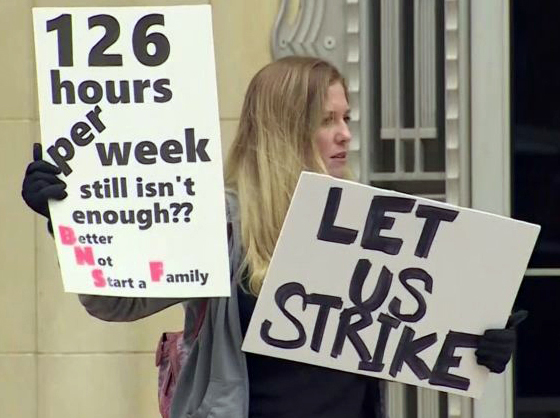In the 12 months following the U.S. Supreme Court’s Dobbs decision that ruled Roe v. Wade unconstitutional, there was an increase in the average number of legal abortions to 82,298 each month. This rise takes place while steady jobs with wages high enough to start and sustain families is less and less available for tens of millions of workers.
And the rise in the number of abortions refutes the false claim made by Democrats and liberal women’s groups that the Dobbs ruling outlawed abortion. By overturning the Roe decision the court handed the issue back to the people and their state representatives to settle.
The rising demand for abortion is deeply intertwined with the broader social crisis workers face. More of us are struggling to pay the rent or afford medical care, food and other essentials. The decision to start families has become increasingly difficult. Workers with children in many cities are forced to choose between cutting back on work hours, relying on relatives to take care of their kids or moving away, hoping to find a place to live and work where child care is cheaper.
More women find themselves forced to consider abortion when faced with an unplanned pregnancy.
“I’d like to have three kids,” Hannah Puckett told New York Magazine. “But I can’t imagine trying to bring a child into the world with the economy the way it is. I’m scared. I couldn’t give them an education and a house to stay in.” The 21-year-old student is from West Virginia, one of 35 states with fewer children today than five years ago.
The decline in availability of affordable health care exacerbates the challenges workers face. Fewer than half of women in rural areas can find prenatal care within 30 miles. In 2021, more than 1,200 women died while pregnant or shortly after giving birth, the highest number since 1965.
Central to union struggles taking place today is fighting for conditions that would make starting and building families easier. Ending draconian work schedules and mandatory overtime, demanding cost-of-living increases to keep up with rising prices and putting an end to divisive multitier contracts are a growing part of many strikes. Working-class struggles to change these conditions are an indispensable part of building the unions and fighting for women’s emancipation.
Since the Dobbs decision, 20 states, along with Washington, D.C., have expanded abortion access, while 21 states have increased restrictions on the procedure. At the same time, the Democratic Party is moving to narrow the room for the needed debate on this issue.
They’re pushing to change state constitutions to “enshrine” the right to abortion forever, making it harder to address a hotly disputed issue with deep moral implications involving human life.
Such constitutional changes have been passed in California and are on the ballot in Ohio this November and in Maryland next year. Democrats in New York have raised $20 million to put the issue on the ballot in 2024 in a bid to attract voters and aid the Biden reelection effort.
The Socialist Workers Party in Ohio is urging workers to vote no on the referendum.
Neither the Democratic nor the Republican Party offer any road out of the deteriorating conditions of life and work that make starting families ever harder. Both parties stand with the bosses in their rapacious drive for bigger profits at workers’ expense.
Only the working class acting in our own interests can begin to change this and provide a road to ending the second-class status of women. That requires addressing the challenges and responsibilities that fall overwhelmingly on women as the bearers and nurturers of new life.
Whether or not to have an abortion is a medical decision that should be in the hands of the woman alone, without any state, federal or municipal restrictions on the safe availability of the procedure. The fight for widely accessible medical care, child care, and other social steps to reinforce the care and feeding of the future generations is key. Abortion should be something needed only when all other things fail.
That course is inseparable from the struggle to replace the profit-driven rule of the capitalist class with workers taking political power into our own hands. This is the only road to end exploitation and oppression and create the material and social conditions that will enable women and men to realize the basic conditions of our humanity. That’s the road to the emancipation of the working class, to eradicate the historical roots of women’s oppression for all time.


